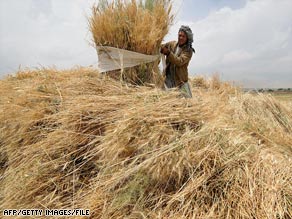LASHKAR GAH, Afghanistan (CNN) -- Toiling in what once was the opium capital of the world, farmers in southern Afghanistan are swapping out their poppy plants for wheat crops.

A farmer harvests wheat in a field on the outskirts of Kabul, Afghanistan, last summer.
The farmers are participating in programs sponsored by the U.S. Agency for International Development, which is offering seeds, fertilizers and improved irrigation to the region in an effort to stop poppy crops and, ultimately, the production of opium and heroin.
Observers have noticed a significant decline in the opium trade in Afghanistan, with the number of poppy-free provinces increasing from 13 in 2007 to 18 in 2008, according to a U.N. report released last year.
Opium cultivation in the country, which has 34 provinces, dropped by about 20 percent in a year, the U.N. reported in August.
"It's a challenge to deliver assistance in a war zone -- you can hear fighter jets flying above us right now," said Rory Donohoe, a USAID development officer.
"At the end of the day, what we found is successful is that we work in areas that we can work," he told CNN in a recent interview in Helmand province.
"We come to places like this demonstration farm where Afghans can come here to a safe environment, get training, pick up seeds and fertilizer, then go back to districts of their own."
Many of Afghanistan's northern and eastern provinces have already benefited from USAID alternative farming programs, which have doled out more than $22 million to nearly 210,000 Afghans to build or repair 435 miles (700 kilometers) of roads and some 2,050 miles (3,300 kilometers) of irrigation and drainage canals.
'Remainder > Issue' 카테고리의 다른 글
| "Paying the highest score" ... Kim Yu-na, 4 continents, in the short新72.24 points (0) | 2009.02.17 |
|---|---|
| 스타2 곧 베타테스트 돌입, 새로운 배틀넷도 포함 (0) | 2009.02.12 |
| Obama and S.Korea's Lee vow to fight protectionism (0) | 2009.02.03 |
| 빅뱅 스타일리쉬 - FILA 광고 (0) | 2009.01.07 |
| 최홍만, 크로캅 상대로 1R 6분32초만에 TKO패 (0) | 2009.01.01 |